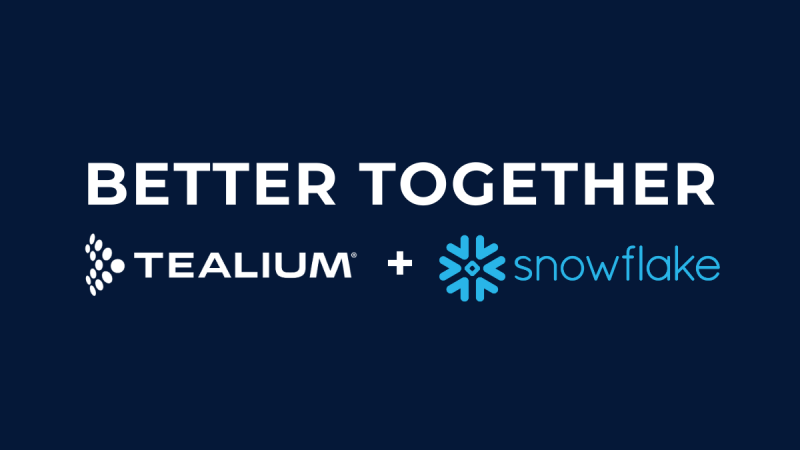This blog discusses Tealium’s Customer Data Platform and its features for orchestrating customer data in a modern, real-time fashion.
Features and Benefits of Tealium’s Events, Functions, and Attributes
- Tealium’s platform enables data activation through Consented Events, Functions, and Attributes, enhancing customer interactions and insights.
- Events capture user interactions, providing valuable insights into behaviors and preferences without complex IT dependencies.
- Functions is a serverless data stream processing environment, enabling developers to apply custom JavaScript logic to transform, clean, and enrich data in stream. Functions can help developers save time, reduce errors, and improve data quality.
- Attributes enrich customer profiles dynamically, allowing for personalized marketing and segmentation based on real-time data.
- All of this results in the ultimate modern real-time data supply chain.
First-party data is a crucial asset, driving smarter decisions, personalized marketing, AI models, and seamless customer experiences. However, data is only as valuable as it is actionable, and making it accessible to teams across the organization is key. This is where Tealium’s Customer Data Platform shines, enabling data activation with an intuitive UI. By leveraging Consented Tealium Events, Functions, and Attributes, businesses can create powerful, data-driven customer use cases without needing complex development or IT cycles. Let’s explore how these features can help unlock the full potential of customer data.
Tealium Events: The Foundation of Customer Interactions
What Are Tealium Events?
Tealium Events are the building blocks of customer interactions and are captured according to every user’s consent preferences. Every time a user interacts with your website, app, or channel of engagement, it generates a consented event. In Tealium, these events can range from page views and clicks to more complex interactions, like form submissions, mouseovers, rage clicks, or product and video views.
Why Do Consented Events Matter?
Events provide insight into user behaviors, preferences, and engagement patterns. You can gain a more complete picture of each customer’s journey by capturing these moments.
Are Tealium Events Easy To Use?
Yes, Tealium Events is easy to use. With Tealium’s no-code interface, you can set up and manage events easily—no need for complex implementation processes or IT dependencies. This accessibility means that marketing, AI, and analytics teams can quickly activate or modify events as business needs evolve.
Tealium Functions: Transform and Enrich Data in Real Time
What Are Tealium Functions?
Tealium Functions allow you to manipulate and transform incoming data in real-time, unlocking more complex use cases and allowing you to tailor data for specific actions or analysis.
Use Cases for Tealium Functions
For example, you can create a function that categorizes users based on frequency of engagement, transforming raw data into actionable customer segments. Or, you can use functions to calculate metrics, like cart value thresholds, which might trigger targeted messages to high-value customers. You can even use a function to call another system and receive back a payload such as an AI/CDW or identity service.
What Is The Value of Tealium Functions?
Typically, data transformations require third-party software and customization and never act in real-time. Tealium’s functions make this possible with its easy-to-use UI. This empowers teams to create custom data transformations and conditions without waiting for developer resources. Soon users will be able to leverage natural language to define and create Functions making it even more powerful and accessible across the entire organization.
Tealium Attributes: Building Rich Customer Profiles
What Are Tealium Attributes?
Tealium Attributes are characteristics of your users, like demographics, behavioral patterns, or transaction history. The most powerful aspect of Tealium Attributes is that they can calculate and enrich data in real-time as behaviors and events are captured. Tealium allows you to define and leverage attributes to build rich, detailed customer profiles that can be used across various touchpoints. These attributes constitute the profile and all remain intact and fully up to date in real-time.
What Are Examples of Tealium Attributes?
Tealium offers attributes—such as badges, metrics, and tallies—that help you better understand and categorize customer behavior. For instance, you can create an attribute to identify VIP customers based on lifetime purchase value or to flag users who abandon carts frequently. There are hundreds of attribute models available out of the box leaving no use case behind.
Are Tealium Attributes Easy To Use?
Yes, Tealium Attributes is easy to use. In the no-code UI, adding or modifying attributes is straightforward. You can define, update, and activate these attributes as your understanding of your customers grows, which allows for a truly dynamic customer profiling experience. Remember, these attributes calculate and resolve in sub-200 ms so they are always the absolute in-the-moment activation elements.
Putting It All Together: Customer Data Use Case Examples
With Tealium’s Events, Functions, and Attributes, you can create a wide range of powerful customer data use cases.
Here are some examples:
- Fuel AI Projects: Collect consented engagement data (Events) and then hash or obfuscate PII (Functions) to leverage this clean correlated data to create AI-ready insights that can be streamed in real-time to any CDW or AI application. This can be an explicit call out to an external AI model for things such as fraud detection, propensity scoring, or next-best-action.
- Personalized Product Recommendations: Track users’ product interactions (Events), calculate the most-viewed categories (Tealium Functions), and then assign these preferences as attributes. Use this data to dynamically personalize website content and emails.
- Real-Time Cart Abandonment Alerts: Trigger an event when a customer begins a conversion process but leaves the site. Use a function to calculate the cart or stage value, and if it exceeds a threshold, send a personalized message to the customer encouraging them to complete their purchase.
- Customer Lifetime Value Scoring: Track all customer purchases and use functions to aggregate total spending over time. Assign a high-value badge as an attribute once they pass a defined spend threshold, allowing you to reward loyal customers with special discounts.
Why Tealium’s Customer Data Approach is a Game-Changer: Turning Data Into Action
The intuitive design in Tealium democratizes access to customer data insights, allowing more teams within an organization to be directly involved in creating and activating customer data strategies. It reduces dependency on technical resources, shortens time to market, and enables a more agile approach to data-driven decision-making and AI outcomes.
With Tealium’s Events, Functions, and Attributes, powered by a user-friendly low/no code UI, organizations can swiftly turn data into action. Whether it’s real-time personalization, customer segmentation, or targeted messaging, Tealium empowers you to bring customer data use cases to life, maximizing value for both the customer and your business.







